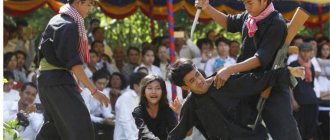MIP Legal Encyclopedia online - » Criminal cases - comments of a Federal Judge / MIP Law Group » General provisions of the Criminal Code of the Russian Federation - comments of a Federal Judge / MIP Law Group » Voluntary renunciation of a crime - comments of a Federal Judge / MIP Law Group
Sign up for a consultation with the head of the criminal department. We specialize in Article 31 of the Criminal Code of the Russian Federation. Professional explanations. Unlimited consultation time
Voluntary renunciation of a crime - free answers from lawyers online
The concept of voluntary renunciation of crime
The commission of any crime is divided into three stages:
I. Preparation stage. The moment when a person harbors plans to commit a crime and prepares favorable conditions for carrying out an illegal deliberate action.
II. Attempted crime. A person makes an attempt (attempt) to commit crimes, but does not receive the final result. The attempt itself is already a crime. It is possible to give up thoughts of finishing a planned criminal act against a specific person or society as a whole after an unsuccessful attempt. If the criminal, after being unable to complete his plan, attempts again, he is held accountable to the fullest extent of the law.
III. Completed crime.
A stage that becomes a crime according to the canons of the Criminal Code of the Russian Federation, when the criminal has achieved his goals.
The thirty-first article of the Criminal Code of the Russian Federation provides that it is possible to abandon plans and not commit a crime. This matters when a person who has made a plan to commit one or another act unlawful in relation to society, at will, stops preparations for the impending crime or the fact of its commission.
Voluntarily giving up criminal plans differs significantly from active repentance, stipulated by the seventy-fifth article of the Criminal Code of the Russian Federation.
You can repent after a crime has actually been committed or an attempt has been made. It is expressed in confession and voluntary compensation for damage caused to the person or society against whom illegal actions were committed.
Refusal to end a crime, expressed in one’s own desire, is recognized as such if criminal actions against society have not been committed, even if there was an attempt.
Another difference is that voluntary refusal to commit a crime may be the reason for exemption from bringing an individual to justice under the law if the person hatched a plan to commit illegal actions against public life, but refused to put it into practice.
Active repentance will not be a reason to terminate criminal proceedings for violating the law. But it can serve as a mitigating circumstance when it comes to sentencing.
What is the sentence for attempted murder?
According to the general rule established in Art. 66 of the Criminal Code of the Russian Federation, the term assigned for an unfinished crime (attempt) cannot be more than 3/4 of the maximum amount of the most severe punishment for a crime of this type.
If we are talking about murder, then the most severe punishment for it is the death penalty. But, firstly, in the Russian Federation there is a moratorium on this type of punishment, and secondly, in paragraph 4 of Art. 66 of the Criminal Code of the Russian Federation there is a direct indication that the death penalty for attempted crime cannot be imposed.
The same applies to this type of punishment, such as life imprisonment: it is not assigned for attempted murder. Thus, the maximum penalty for attempted murder can be no more than 15 years in prison. This punishment is applied for committing murder under Part 2 of Art. 105 of the Criminal Code of the Russian Federation, i.e. in the presence of aggravating circumstances, such as:
- two or more victims;
- a victim who is in an obviously helpless state;
- there was a kidnapping with intent to murder;
- the victim is a pregnant woman;
- the crime was committed with particular cruelty (torture was used, the victim was mocked, etc.);
- victim - a person (or his relatives) performing official duties or public duty;
- an attempt to commit a crime in a generally dangerous manner (for example, through an explosion, arson, shooting in a public place, etc.);
- the motive for the murder is blood feud;
- the attempted crime was made by a group of persons (with or without prior conspiracy);
- the attempted crime was made for selfish or hooligan motives;
- the attempted crime was accompanied by extortion or robbery;
- the criminal acted on the instructions of the customer (hiring a killer);
- the purpose of the crime is to conceal another crime or mitigate its consequences;
- there was sexual violence;
- the motive of the crime is enmity and hatred towards one or another social group;
- the purpose of murder is to use the tissues and organs of the victim.
In the event of an attempt, maximum liability is established in accordance with Part 1 of Art. 105 of the Criminal Code of the Russian Federation and cannot be more than 11 years and 3 months.
Note! If the attempted murder was committed by a minor, then the responsibility for him will be less. The maximum penalty in this case is four and a half years for those under 16 years of age and seven and a half years for those who have reached their 16th birthday. In this case, the offender will not be sent to prison, but to a juvenile colony.
If a mother attempted to kill her newborn child, the sentence is set based on the provisions of Art. 106 of the Criminal Code of the Russian Federation and cannot exceed 3 years and 9 months.
It is worth considering separately murders that were committed in a state of passion. According to the provisions of Art. 107 of the Criminal Code of the Russian Federation, the maximum term for such a crime is three or five years (if there were 2 or more victims). This means that for an attempt to commit such a crime, the maximum punishment is 2 years 3 months and 3 years 9 months, respectively.
The statute of limitations for attempted murder is not reduced. It is equal to the statute of limitations established for murder, i.e. 15 years old.
Conditions and signs of voluntary renunciation of crime
Voluntary renunciation of a crime can be characterized by the following features (signs):
- a timely decision to abandon thoughts of committing illegal actions against people and society as a whole. Refusal from a crime is possible only before actions have been committed that led to dangerous consequences;
- the decision to refuse to commit a crime was made out of free will and not coercion. Realizing that evil intent can be brought to an end. refusal to bring illegal ideas to completion will not be voluntary if they were not completed due to prevailing circumstances or if a person preparing to commit a crime was forced to abandon it, no matter in what way.
- finality of the decision to refuse to commit a crime. A person, having begun a criminal plan, abandons it irrevocably; the important thing here is that he understands that he could bring the matter to a criminal conclusion. Signs that are considered basic in case of voluntary refusal to commit a crime - a person of his own free will stops the crime he has begun, although he understands that he cannot be prevented from completing his plan.
Voluntary refusal during preparation and unfinished crime
Signs that are basic when a person voluntarily decides not to commit a crime - it is by his own free will that the person stops the crime. At the same time, he realizes that there are no obstacles to bringing his plans to the end that was originally intended. The motivation to change the decision is not important. This may be a fear of being held responsible for the evil done, or repentance that has occurred, so to speak, pangs of conscience.
It turns out that voluntary refusal is the desire to stop in the very process of preparing the commission of an unfinished crime, if a person, renouncing his criminal intentions of preparation, realizes that he can complete the prepared act without hindrance.
In the case where the actual execution of a crime is simply postponed due to the fact that some insurmountable factors interfere with the planned time of commission, this is in no way considered a voluntary refusal to commit a crime.
Is it possible to recover moral damages?
People whose lives have been attempted are often concerned with the question: is it possible to demand compensation for moral damage from the perpetrator?
This question is resolved as follows:
- A civil claim within the framework of a criminal trial can be filed at any time before the end of the judicial investigation (Part 2 of Article 44 of the Code of Criminal Procedure of the Russian Federation). If this was not done, recovery will have to be made separately within the framework established by civil procedural legislation.
- Art. Art. 151, 1099 of the Civil Code of the Russian Federation allow the recovery of moral damage caused by a crime.
- The upper limit of recovery is not limited, but the court has the right, according to Art. 1101 of the Civil Code of the Russian Federation, reduce the amount of compensation to a reasonable extent.
Important! More detailed questions of compensation are regulated by the resolution of the Plenum of the Supreme Court of the Russian Federation No. 10 of December 20, 1994.
Voluntary refusal in case of complicity in a crime
The fourth part of Article 31 of the Criminal Code of the Russian Federation defines the specifics of the voluntary refusal of accomplices of an impending and unfinished crime.
Depending on what role the accomplices play in the crime being prepared, there will be release from liability or mitigation.
The voluntary refusal of the accomplices, first of all, must be active and aimed at preventing the other participants in the conspiracy from completing their malicious intent.
If in those cases where a crime is prepared personally without the involvement of accomplices, it goes without saying that if a person voluntarily refuses to commit the crime, it will not be completed.
When a group of people is preparing to commit a crime, then if one of the accomplices voluntarily refuses to commit criminal acts, we are not talking about the fact that it cannot be completed. Therefore, having given up the idea of committing malice, the accomplice in a group crime must actively help prevent the crime from happening in the first place.
Consequences of voluntary renunciation of crime
People who organized a crime and incited actions can be completely exempt from prosecution under the Criminal Code of the Russian Federation for promptly informing the authorities that a crime is being prepared, the date and time, or, having prevented it from being completed on their own, by interfering the performer to fulfill his plans.
In cases where a person who is preparing to commit criminal acts himself voluntarily renounces the idea of committing a crime, the legal consequences occur in accordance with the fact that the malicious intent will not be clearly completed, which means that the person may not be held accountable under the Criminal Code RF with subsequent punishment. But there will be no legal consequences only in cases where, while preparing to commit one crime during the preparations, another crime was not committed at the same time.
If the crime was not stopped, then the measures taken to stop the preparation and completion of the unfinished crime can be counted as circumstances that will mitigate the penalties when considering the case in court.
If an accomplice to a crime refuses to commit a criminal plan, he will not be held criminally liable under the Criminal Code of the Russian Federation, if he takes measures within his power to prevent the crime, regardless of whether the perpetrator committed the crime to the end or stopped.
What types are there?
Attempts in the theory of criminal law are usually divided into several different types:
- Finished. In this case, the perpetrator performed all the actions necessary to cause death. However, the result did not occur due to reasons beyond the control of the person. An example of this can be considered the following situation: the criminal took out a pistol, took aim correctly, pulled the trigger - but at the last moment his hand trembled or the intended victim suddenly abruptly moved from the line of fire. Here the would-be killer did everything that depended on him, but the crime could not end.
- Unfinished. Here the criminal does not complete the murder process - however, also not through his own fault. Relatively speaking, the killer took aim - but a random passer-by knocked the pistol out of his hands. Here it cannot be said that everything was done to obtain a result, however, as in the previous case, the criminal was unable to kill due to circumstances that were beyond his control.
- With worthless means. In this case, the criminal performed all the necessary actions, not knowing that the weapon he was using was not suitable for murder. Returning to the example with the pistol: the criminal took aim, pulled the trigger, no one stopped him - but it turned out that the pistol’s firing pin had long been sawed off, and the would-be killer did not know about it.
- To an unusable object. In this case, the offender does not know that his actions cannot harm the victim. If we continue to use the example with a pistol, then in this case the criminal shoots, not knowing that the bullet will hit the doll representing the victim - or the corpse, if the victim was already dead by that time. In practice, this type is extremely rare.
More details about the types of murders and other nuances of the crime can be found here.
Liability for voluntary renunciation of a crime
In Art. 31 of the Criminal Code of the Russian Federation, at the legislative level, refusal to complete an unfinished crime is recognized as voluntary, when all preparatory and preparatory actions for the intended crime cease.
Criminal liability for crimes that people changed their minds about voluntarily has its own characteristics. No measures of influence are applied to a specific person, they are not applied. But, if during the course of the crime being conceived and prepared, another criminal act was committed that violated the law, then one will have to answer for the crime committed.
The release of accomplices, as a group of accomplices in a crime, is more simplified than that of persons organizing illegal events and morally inciting them to commit it.
It is important to remember that it is possible to voluntarily stop illegal plans at any stage of the preparation and preparation of the action itself that violates the law until the moment it is committed. If the completion of a criminal act was prevented by external interference, this does not apply to a voluntary refusal to commit a crime.
Author of the article
When can there not be an assassination attempt?
In some situations, for crimes classified by law as murder, there cannot be an attempt, i.e. Article 30 of the Criminal Code of the Russian Federation does not apply to such compositions. This:
- causing death as a result of careless actions (Article 109 of the Criminal Code of the Russian Federation).
In this situation, there is no intent, which is the main qualifying feature for attempted murder;
- a murder that was committed due to excess of self-defense.
In such cases, there is no unfinished crime, which is also the main sign of an attempt. When qualifying a crime under Art. 108 of the Criminal Code of the Russian Federation requires proof that self-defense was necessary. If this is indeed the case, then the actions of the perpetrator of the crime cannot be regarded as attempted murder, since in self-defense it is impossible to plot something, the main goal is to repel the attack and save your life. If during the trial it is not proven that self-defense was required in this case, then the crime will be classified either as ordinary murder (for which an attempt is provided) or as infliction of bodily harm;
- an attempt to kill a law enforcement officer.
This crime is qualified under Art. 317 of the Criminal Code of the Russian Federation. Even if it was not completed due to circumstances beyond the control of the offender, liability will still occur in accordance with Art. 317 of the Criminal Code of the Russian Federation.









